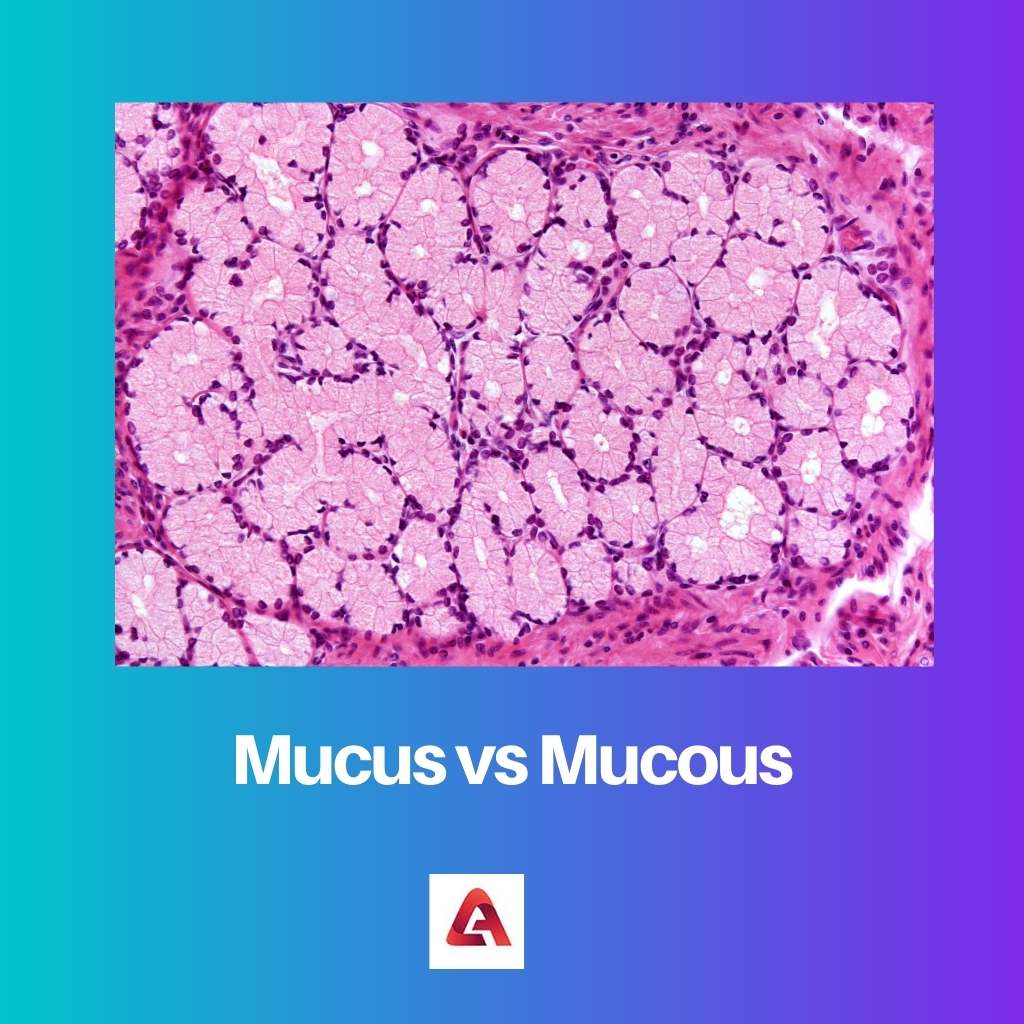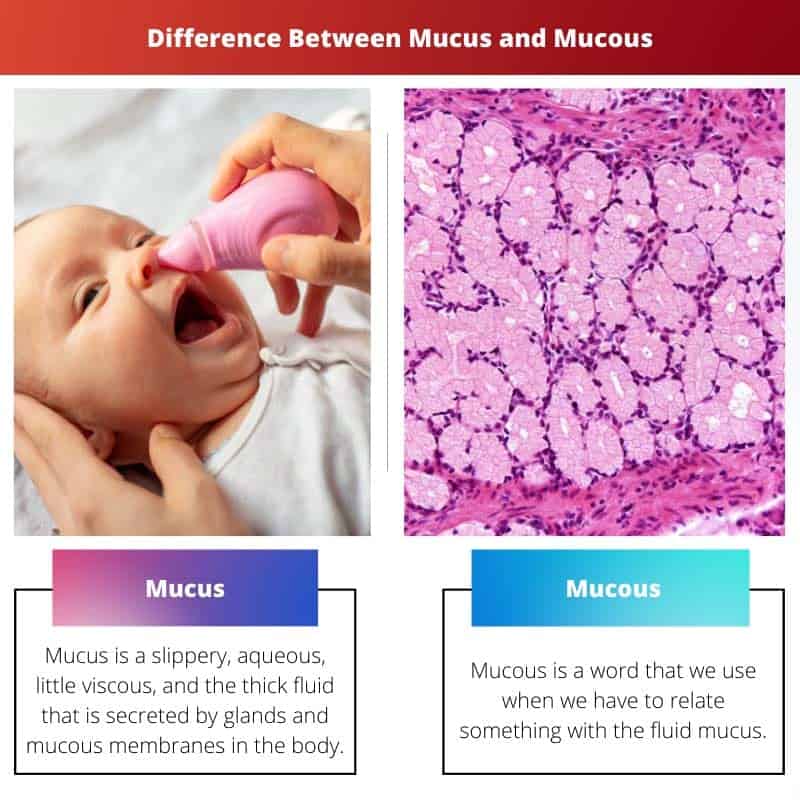Certain glands and various organs in our body secrete vivid organic and inorganic secretions that form a layer over other glands, body walls, or organs so that they can do lubrication on them.
They have certain functions, purposes, and actions that can be analyzed in a biological aspect.
Key Takeaways
- Mucus is a viscous fluid produced by mucous membranes, while “mucous” is an adjective describing the membranes or their secretions.
- Mucus functions to protect and lubricate internal body surfaces, while mucous membranes line various body cavities.
- Both terms are related to the body’s immune system and its defense against foreign substances.
Mucus vs Mucous
“Mucus” refers to the slimy substance produced by the body’s mucous membranes, which line various organs such as the respiratory and digestive tracts. “Mucous” is an adjective that describes something related to or containing mucus, such as “mucous membranes.”

Mucus is a noun. The term is used as a term we give to the secretion of aqueous or slippery fluids that the membranes of our body produce so that a lubricating protective layer can be made over other body areas requiring certain organic or inorganic fluids.
Mucous is a word that is an adjective. It is not a fluid secreted, but it is used when something is related to mucus secretion. For instance, the membranes that secrete mucus are called mucous membranes.
Mucous is a membrane that secretes mucus fluid.
Comparison Table
| Parameters of Comparison | Mucus | Mucous |
|---|---|---|
| Meaning | Mucus is an aqueous and slippery fluid that is secreted by specific membranes of the body. | Mucous is a word that is used for relating to mucus or defining something that resembles mucus. |
| Grammatical use | Mucus is the form of an uncountable noun. A noun names something. | A mucous word is an adjective to describe mucus. It is used with membranes. |
| State | A mucus is a fluid that stays in a liquid state. | Mucous is described as a membrane chain and is in a solid-state. |
| Fundamental constituents | Mucus is an oily aqueous and thick liquid containing salts, dead cells, water, etc. | Mucous, known as membrane, contains glands that secrete mucus and inner linings like skin. |
| Stability | Mucus is not stable. It can continue to flow or bind over the surfaces. | Mucous is membranous and secretes mucus. It is stable. |
What is Mucus?
Mucus is a slippery, aqueous, little viscous, and thick fluid that is secreted by glands and mucous membranes in the body. The mucus word itself in Latin English means slime and slippery substance.
The mucus is secreted by certain glands and mucous membranes in different regions inside the body.
Mucus is a fluid substance that is the combination of inorganic and organic constituents such as dead cells, specific salts, inorganic materials, lubricating fluids, water, enzymes, etc., secreted by certain body parts.
It is a very complex fluid and is secreted in specific proportions and manner from several glands. Its main function is to offer lubrication to the body’s inner linings and glands that require protection.
Whenever the body needs proportions and protection from foreign particles or just a thin layer, mucus is produced and made in use by the body.
It comes in the line of the defence system that the body adapts to treat foreign particles like pathogens.
Mucus secretion has several roles for different catabolic and anabolic processes in the body and almost all the systems of the body, like the respiratory system, excretory system, etc.
The excessive secretion or less secretion of it also marks certain problems and actions that the body faces.
What is Mucous?
Mucous is a word that we use when we have to relate something with the fluid mucus. It refers to the secretion of mucus fluid. Mucous is also used synonymously with the mucous glands and the mucous membranes.
These mucous glands and mucous membranes do the secretion of mucus.
In other words, mucous is also used as the inner lining and pattern of several membranes and the body’s internal linings that secrete mucus fluid.
It is a membranous substance and consists of constituents like cells, inorganic and organic salts, and enzymes linked with the membranous walls of the body. These membranes secrete mucus fluid.
The fluid is also secreted and maintained by specific glands in the body. Not just the glands and the membranes, the fluid is also secreted by several tissues and organs of the body.
Moreover, the mucous membranes lie in several body regions like the nose, mouth, lungs, etc. They are always moist and wet because the secretion keeps them optimal. Mucous membranes adhere to the inner linings of the body and produce mucus.
Mucous membranes best serve the task of protecting the body from foreign invaders like pathogens. They trap foreign particles and protect the body.
Main Differences Between Mucus and Mucous
- Mucus is a viscous, thick, and nearly white fluid secreted by the glands, whereas mucous is a set of membranes or glands that are membranous and solid, having internal linings with body cells and tissues.
- Mucus does not contain membranes and the bloodstream, whereas mucous is membranous and consists of blood linings.
- The action of mucus is measured by its quantity and constituents in it, whereas the mucous membranes are very active in almost everybody region.
- Mucus destroys the foreign material, whereas mucous membranes and glands trap them as the body’s first line of defence.
- The mucus takes less time to get secreted and act, whereas mucous membranes build up over a long time.

- https://link.springer.com/article/10.1007/BF01344269
- https://www.sciencedirect.com/science/article/pii/S1095643302001095

The article offers a profound insight into the biological distinctions between mucus and mucous, increasing my appreciation for the body’s complexities.
I find the wording of the article slightly complex, making it difficult to comprehend for those not well-versed in medical terminology.
It is a bit verbose. However, the depth of the content allows for a thorough understanding of the subject, assuming the reader is willing to invest the time and effort.
I’m uncertain of the necessity for such a detailed comparison between mucus and mucous. The relevance of this information to day-to-day life seems limited.
While it may seem esoteric, knowledge of biological processes enriches our understanding of our own bodies and overall health.
The post accurately details the roles and functions of mucus and mucous in the body, effectively broadening my knowledge on this biological aspect.
This article was quite enlightening, it perfectly clarifies the differences between mucus and mucous. The information is well written and comprehensive, making it easy to understand.
I couldn’t agree more; the meticulous detail provided in the post is commendable. It truly enhances our understanding of the topic.
This content delves into the subject matter with such intricacy that it could be deemed rather pedantic, but the depth of information provided is truly unparalleled.
The expansiveness of the content may come off as excessive, but the level of detail ensures that virtually all facets of this topic are covered.